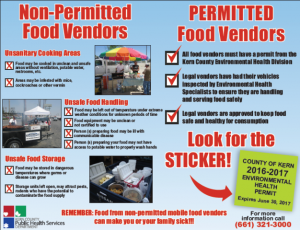Kahtia Hall of Bakersfield Now reports the environmental health division of the Kern County Public Health Services Department is warning people to stop eating from food vendors that don’t have permits because of the health risks involved.
 Last year, Kern County saw close to 500 cases of food-borne illnesses, but there could be more since a lot of those go unreported. Officials with the Health Department say they can’t be sure that contaminated food or drink is the source of all these infections, but the conditions they have seen during inspections have the potential to make people sick.
Last year, Kern County saw close to 500 cases of food-borne illnesses, but there could be more since a lot of those go unreported. Officials with the Health Department say they can’t be sure that contaminated food or drink is the source of all these infections, but the conditions they have seen during inspections have the potential to make people sick.
Here’s a breakdown of the cases of food-borne illnesses last year in Kern County:
- Campylobacteriosis: 303
- Salmonellosis: 125
- Shigellosis: 23
- coli: 17 (including 7 E.coli O157)
- Giardiasis: 14
- Cryptosporidiosis: 5
- Hepatitis A: 4
- Listeriosis: 0
It is required by all mobile food vendors to get licensed by the Health Department if they want to sell food to the public.
Vendors are required to follow food handling and safety standards set by the California Retail Code. Included in this code is a list of food handling tips, including proper hand washing stations, hot and cold temperature controls, measures to prevent cross contamination, proper food storage and food handling training certification.
In addition to this, the Health Department looks at where the food is actually being prepared to make sure there are no unsanitary practices taking place before being sold to the public.
“When we go to some of the homes that are prepping the food, they are doing it in the backyard or garage. We are seeing really unsanitary conditions,” said Environmental Health Director Donna Fenton.
In order for a food vendor to become licensed, it needs to fill out an application form and pay a permit fee ranging from $115 to $650 a year. This all depends on the vehicle and how many inspections it is going to require throughout the year.
“If you are a produce vehicle, you get inspected one time a year. If you are a taco truck, it’s three times a year. Hot dog carts and coffee carts are twice a year, so we make sure that the way they are operated is done in a way that prevents food-borne illness,” said Fenton.
The Health Department also needs to see a restroom authorization form if the vendor is going to be at a location for a long period of time, as well as an itinerary of where it is going to be so the Health Department can inspect it on the field and make sure it is operating in a safe manner.
If approved, the mobile vehicle is stamped with a green sticker that says “County of Kern 2016-2017 Environmental Health Permit.” This green sticker should be placed on the upper left hand side of the mobile food vendor. This is how people can tell if a food vendor is selling legally.
“In Kern County, we currently have 500 permitted food vendors,” said Fenton.
Despite the requirements, there are some who choose not to get licensed and are still operating and selling food. In Kern County Ordinance, it is a misdemeanor violation to operate without a permit, subject up to a $2,000 fine.
Eyewitness News went out on a ride-along with the health inspectors as they went looking for unlicensed vendors. During the time spent with the inspectors, two fruit carts were found, along with a vendor selling honey. All three vendors were selling without a permit.
The fruit carts had gloves but no way to wash hands, and there were no restrooms nearby the carts. There were also no ways to wash cutting boards or knives at the carts.
Fruit carts are not permitted at all in Kern County, because the fruit cannot be stored at the right temperature. Another concern, is having no restrooms nearby, since a lot of the times these fruit vendors are selling in the middle of nowhere with no place to wash hands.
Vehicle inspection days are every Tuesday from 8-10 a.m. at the Kern County Public Health Services Department Environmental Health Division, 2700 M St., Ste. 300. For more information, call (661) 862-8740.


